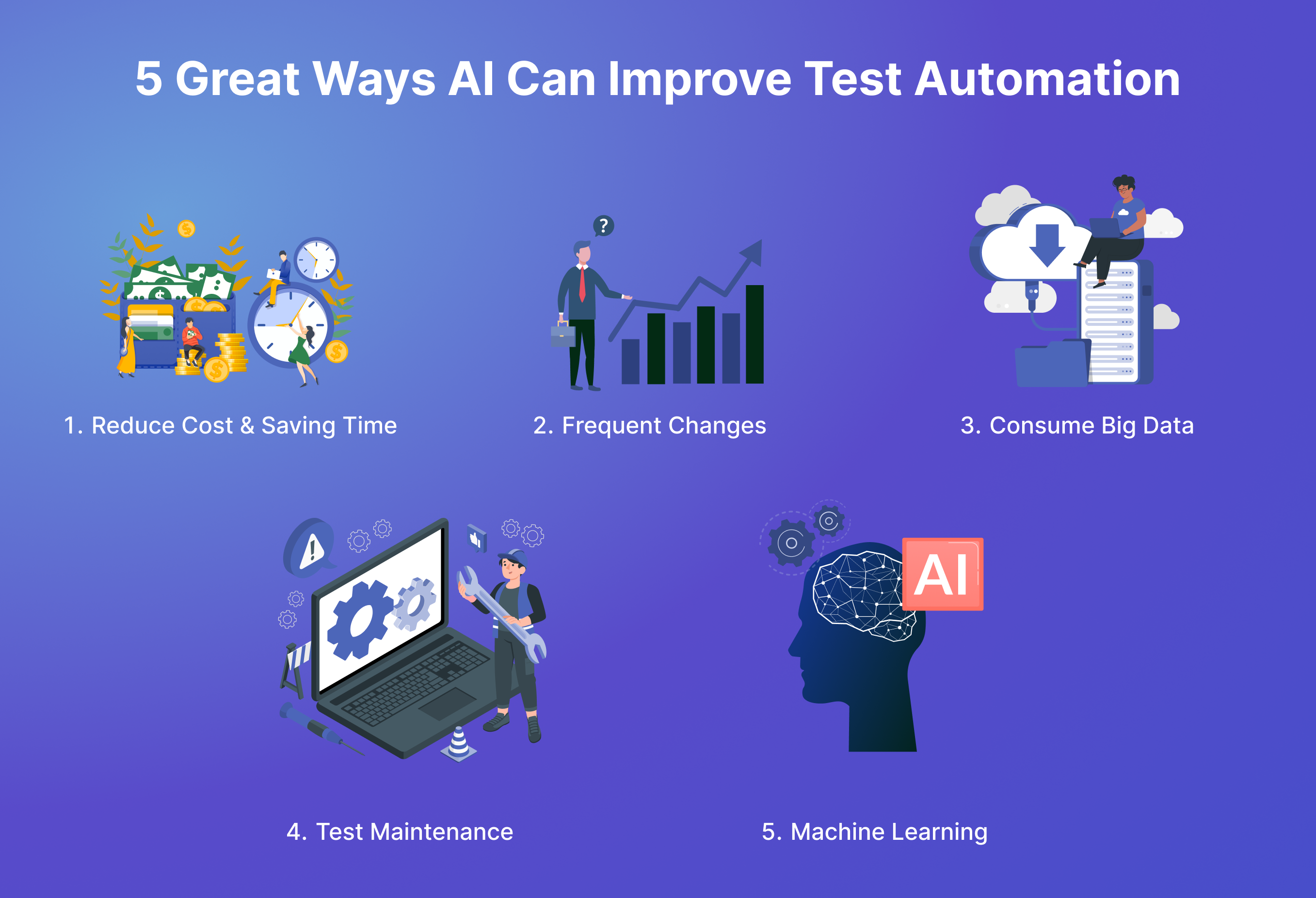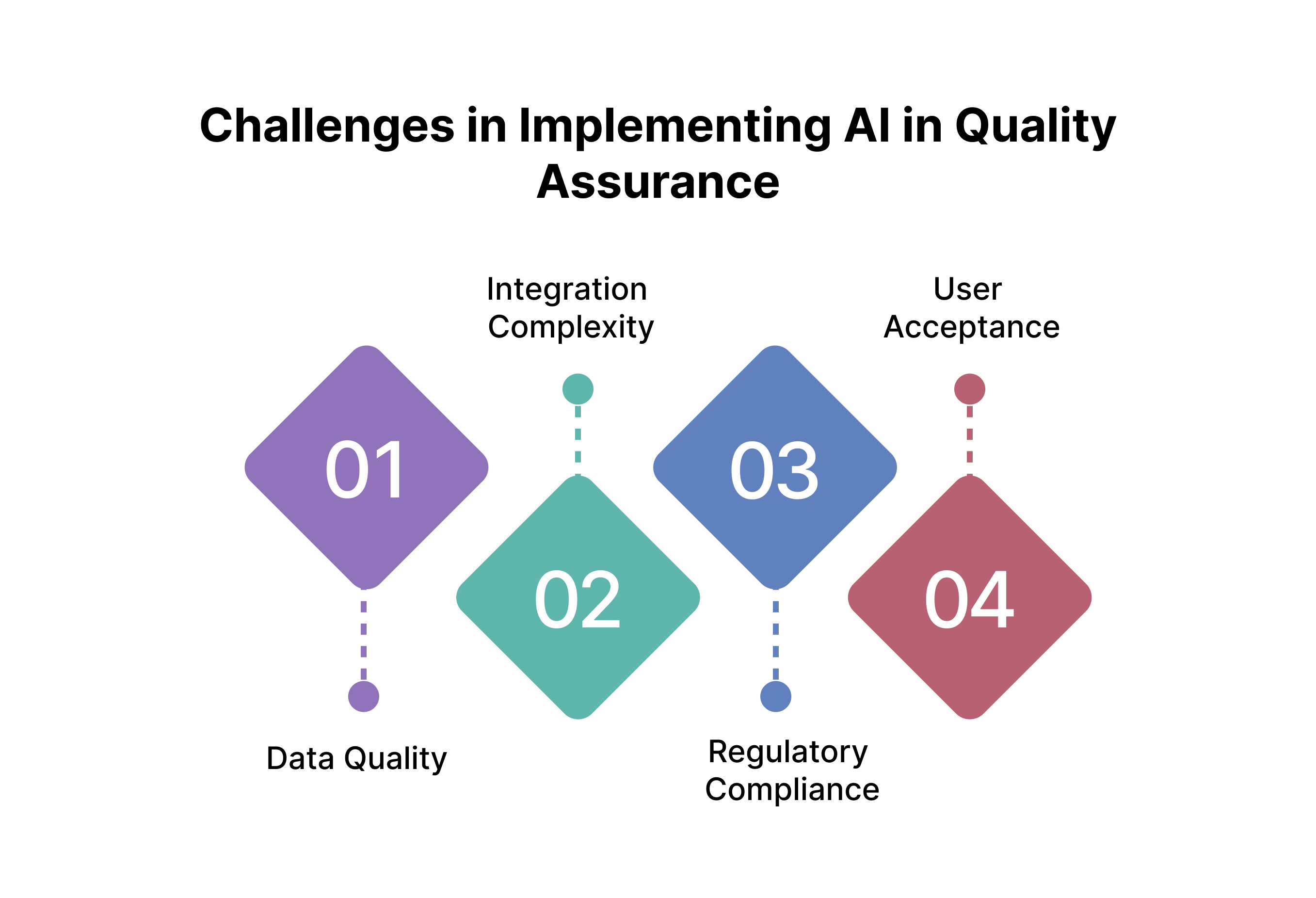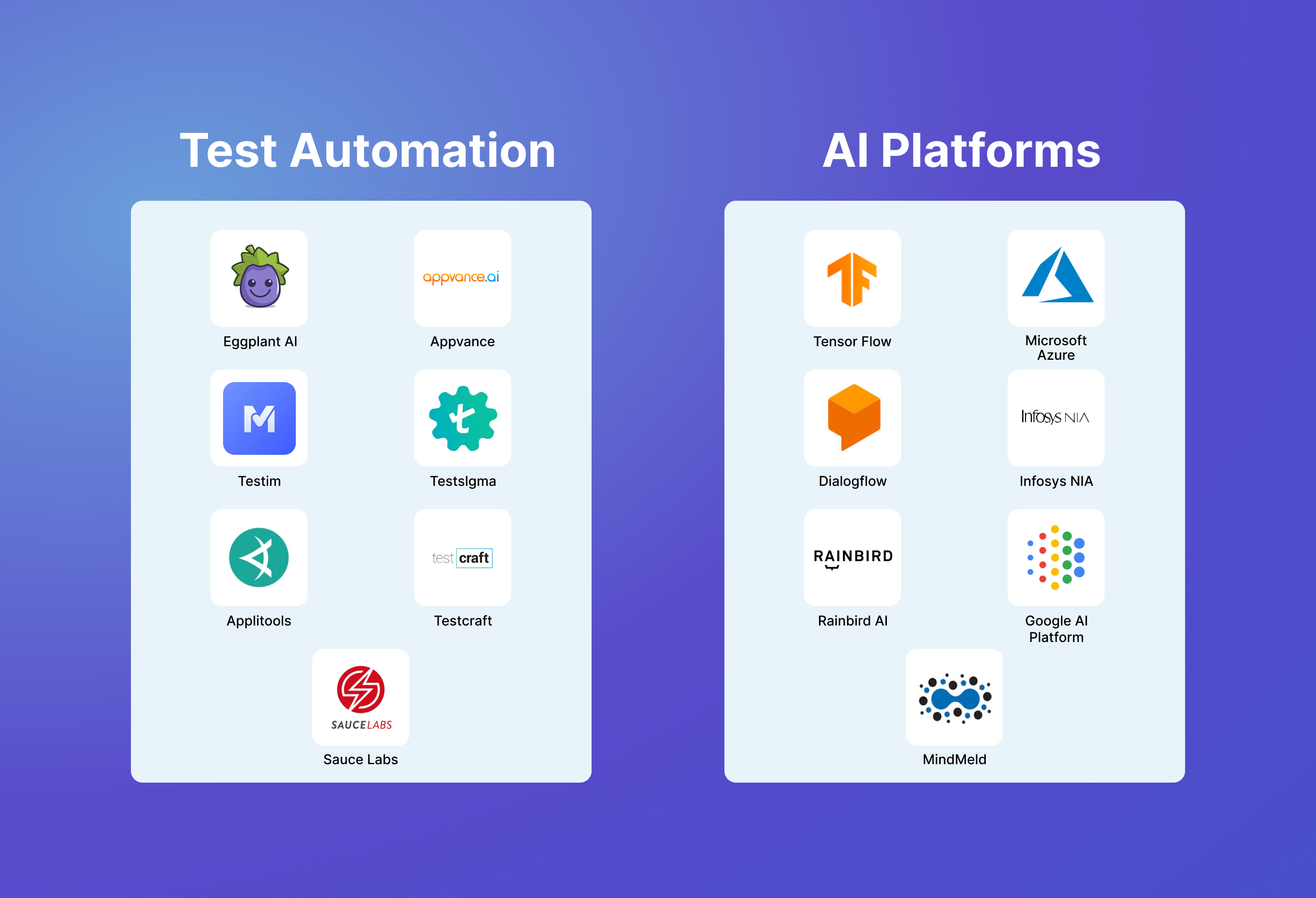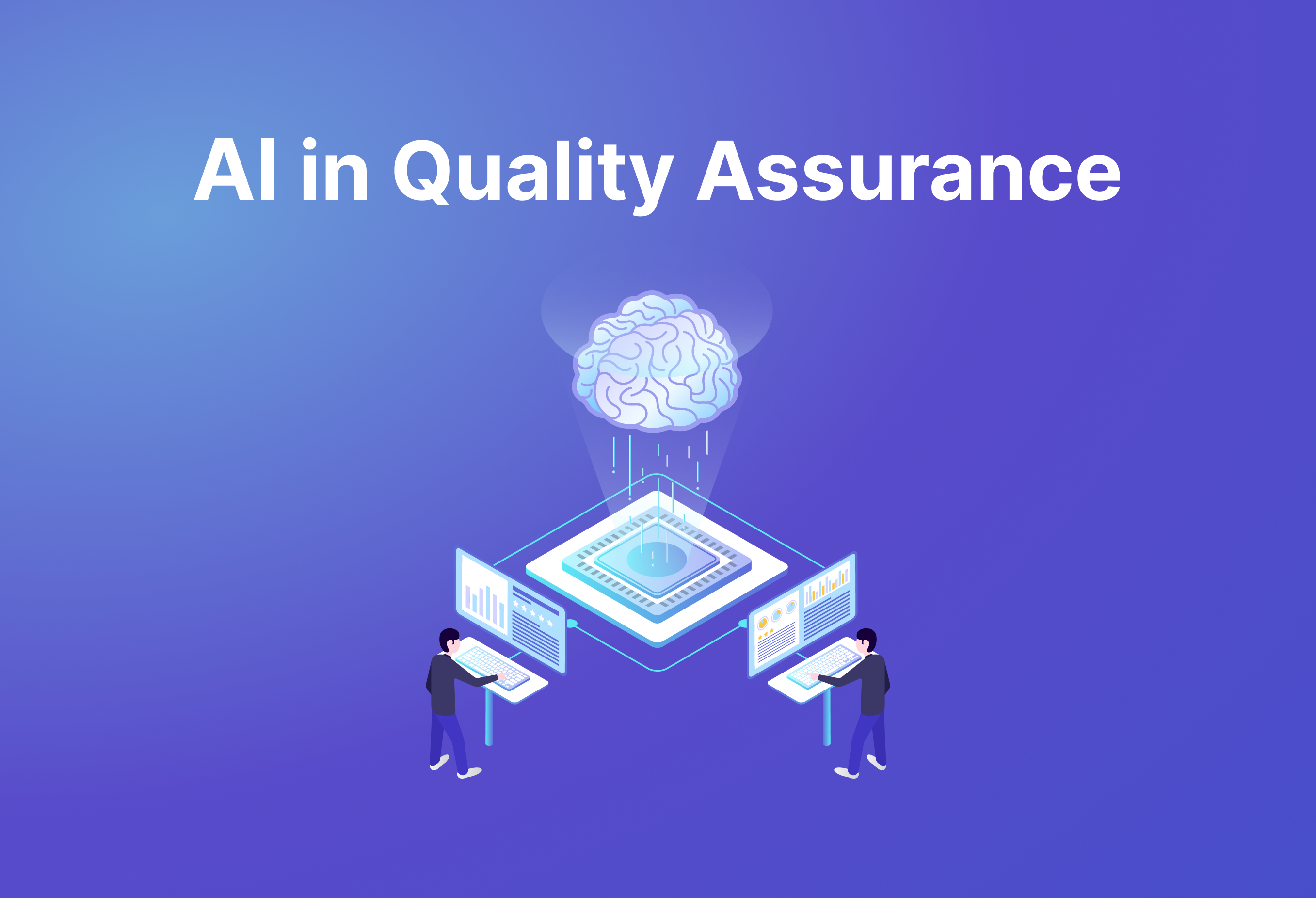AI in quality assurance has become a game changer. Because of its potential benefits, artificial intelligence (AI) is also attracting major financial investments and real excitement from well-known entrepreneurs. Businesses are quick to embrace AI for quality assurance as a means to save costs and improve efficiency.
AI makes things easier for humans
AI makes it simple to share data efficiently, predicts how customers will act, suggests products, spots scams, customizes marketing to specific groups of people, and provides excellent customer service. In case you’re still doubting AI’s usefulness, consider these staggering numbers:
- Sixty-three percent of businesses said they will use AI because they are under financial pressure to do so.
- AI helps 61% of company executives see opportunities they would have missed without it.
How does AI in quality assurance enhance the whole process?
It is crucial to create test data and a test suite in order to assess software and its features. Still, it takes a while to complete this process. Manual testing procedures typically occupy more than a third (around 35%) of the testing time. Furthermore, manual testing always carries the risk of human error. This means extra time and money spent—never something any company wants to do.
It becomes more difficult to maintain a test suite and guarantee adequate code coverage as software complexity increases and the number of tests increases in a natural way. One way to speed up the mobile app testing process and overcome all of those problems is to use AI in quality assurance. AI greatly improves quality assurance testing in the following important areas:
- Complete API testing oversight.
- Automation of testing activities.
- Establishing the best approach and time to run a test script.
- Making better use of spidering tools powered by AI to analyze data more efficiently.

Some of the problems with manual testing and ways in which AI could solve them are as follows:
| Manual Testing Limitations | AI Testing |
| Human Error | Minimizing the likelihood of human error: By ensuring consistent and exact test execution, AI reduces the possibility of human error, including supervision and weariness. |
| Resource Intensive | AI streamlines testing procedures, which saves a ton of time and money and makes testing a more economical option. |
| Inadequate Test Coverage | AI may run a large number of test cases, including edge situations and scenarios, to thoroughly test the program. |
| Repetitive Tasks | By automating mundane testing processes, AI frees up human testers to concentrate on higher-value work. |
| Scalability Challenges | Scalability: Artificial intelligence (AI) is very versatile and can easily handle the larger and more complicated software projects of today. |
Advantages of AI-Guided Quality Control
Utilizing AI in software testing offers unique benefits that have the potential to greatly revolutionize quality assurance. Let’s go into these advantages, with an emphasis on how AI is revolutionizing quality assurance, in more depth.
1. Short Timeframes
Streamlined Testing Procedures
AI powered test automation can go through an enormous amount of test cases at record speeds. This cuts down on testing time. We can do tasks in hours that would normally take human testers days or weeks.
More Efficient Regression Testing
AI automates the process of rerunning test cases to detect unexpected side effects, which simplifies regression testing. This allows for shorter release cycles by making sure that new code changes don’t damage current functionality.
2. Releases of Well-Researched Builds
Advanced Data Analysis
AI has the ability to sift through test results and software performance indicators from the past to foretell possible issues. Teams may concentrate their testing efforts on areas of greatest risk by identifying portions of the program that are more likely to have errors. This leads to better informed build releases.
Ongoing Monitoring
With the use of AI-powered real-time monitoring, we can identify performance problems and outliers in production. This allows us to address critical areas before releasing a new version.
3. Cracking the Code on Automated Testing
Extensive Testing Coverage
AI can conduct comprehensive testing, accounting for a wide range of situations and edge cases that humans could miss. The initiative is tested extensively using this comprehensive array of tests.
Flexibility in expanding operations
As the size and complexity of software projects continue to grow, AI-powered testing has shown to be a very scalable solution. When compared to manual testing, it is more capable of adapting to new technologies, bigger datasets, and changing testing needs.
4. Simple Strategy for Testing
Automated creation of test cases
Automated test case generation is a capability of AI algorithms that may streamline test planning. Producing your own test cases may be a time-consuming ordeal. Yet, these created test cases usually address important situations, boundary conditions, and crucial routes.
Sorting tests by priority
AI has the ability to rank test cases according to their importance and possible influence. This streamlines test preparation by giving top priority to the most crucial tests.
Difficulties in Applying AI to Quality Assurance
To successfully integrate AI into their quality control processes, businesses must face some challenges that come with using AI in quality assurance (QA). Among these difficulties are:
Ensuring Data Quality
The need for high-quality training data is a challenge that QA teams must overcome. The first and most important stage in training AI models is to utilize accurate, representative, and bias-free data.
Level of integration difficulty
The challenge of incorporating AI into preexisting QA methods is real. For a seamless transition, it is crucial to guarantee compatibility, data flow, and correct synchronization with older operations.
Adherence to Regulations
The use of artificial intelligence in quality assurance could be subject to industry-specific data privacy rules and regulations. Maintaining conformity with the regulations is of paramount importance.
User Acceptance
Persuading stakeholders and QA teams of the advantages and dependability of AI-driven processes is crucial. Gaining trust and acceptance requires education, training, and effective communication skills.

Leading AI quality assurance tools
1. TestSigma
- The goal of TestSigma, an AI-powered test automation platform, is to make the process of creating and maintaining tests easier.
- It allows testers and non-technical people to write automated test scripts using natural language processing and AI.
- Features like cross-browser testing, simple maintenance, and self-healing tests are available on the platform.
2. SauceLabs
- SauceLabs is an automated testing platform that runs in the cloud. It covers testing online and mobile applications.
- Even though it’s not a whole AI testing solution, it does include certain AI-powered testing features that may help with both analysis and execution of tests.
- As well as supporting a number of testing frameworks, it offers a diverse set of physical and virtual devices.
3. Applitools
- Applitools’ Visual AI testing product utilizes artificial intelligence and machine learning to automatically identify and assess UI visual differences. Testing websites and mobile apps is where it really shines.
- Layout, rendering, and functional flaws are all within its visual defect detection capabilities.
- Applitools’ visual validation platform makes it easy to add visual testing to preexisting test suites. This connects with many test automation frameworks and tools.
4. TestCraft
- The cloud-based test automation platform TestCraft generates and maintains test scripts with the help of artificial intelligence.
- Its AI engine detects when the tested app undergoes modifications and modifies the test scripts so that they continue to work.
- In addition to supporting a number of CI/CD solutions, TestCraft also provides support for testing mobile apps and online applications.
To improve the precision and efficacy of quality assurance procedures, these solutions use artificial intelligence and machine learning. Think about your team’s technical proficiency, the apps you’re testing (web, mobile, or desktop), and the tool’s compatibility with your current testing framework and tools before making your decision. To find the right match for your company’s needs, it’s important to consider things like price, scalability, and support.

Wrapping up
Software testing and product quality control have entered a new age of efficiency, accuracy, and efficacy with the incorporation of AI into quality assurance. From automating tedious and repetitive testing procedures to allowing predicting fault discovery and boosting performance and security testing, AI-driven technologies are changing the game for quality assurance in enterprises. Businesses may improve the quality of their goods they sell to consumers by using AI to automate testing and guarantee consistent results. In addition to making products more reliable, this change cuts costs, shortens time-to-market, and gives companies the agility they need to succeed in the tech industry’s cutthroat environment.

